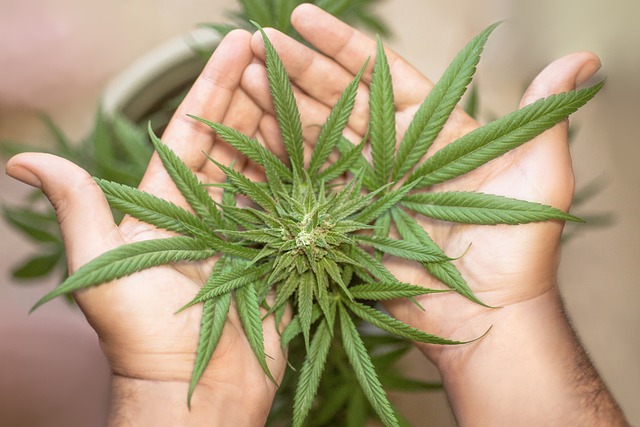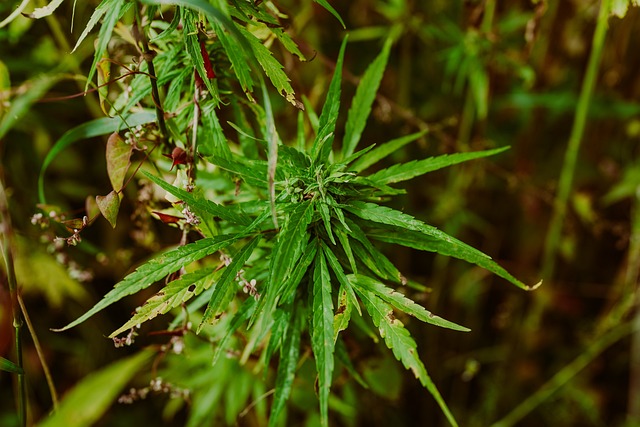THCA infused edibles, which contain the non-psychoactive cannabinoid tetrahydrocannabinolic acid (THCA), are emerging as a natural and effective option for managing pain. Unlike its psychoactive counterpart THC, THCA interacts with the endocannabinoid system to provide relief without altering one's mental state. These edibles offer precise dosing and can be transformed into THC through decarboxylation, enhancing their analgesic properties. The entourage effect, achieved when combined with other cannabis compounds, may amplify THCA's pain-relieving benefits. AK-47, Sour Diesel, Harlequin, and Ringler are notable strains for their pain-relieving qualities. However, it's crucial to navigate the legal landscape of THCA products carefully, as regulations vary by location. Safety is paramount, with users advised to start with low doses, understand personal tolerance, and verify product quality through lab testing. Always store these products securely to prevent accidental ingestion and never operate under the influence. For those interested in making THCA infused edibles at home, it's essential to follow precise recipes and pay attention to cannabinoid chemistry for optimal therapeutic effects.
Exploring the therapeutic benefits of cannabinoids, this article delves into the transformative potential of THCA-infused edibles for managing pain. We’ll uncover the science behind THCA’s analgesic properties, guiding readers through selecting optimal strains and crafting their own homemade edibles. Navigating the complex legal landscape and safety precautions is also covered to ensure informed consumption of these products. Join us as we illuminate the pathway to natural pain relief with THCA flower tips.
- Unveiling the Potential of THCA Infused Edibles for Pain Relief
- The Science Behind THCA's Analgesic Properties
- Selecting the Best THCA Flower Strains for Optimal Pain Management
- Crafting Homemade THCA Edibles: A Step-by-Step Guide
- Navigating Legalities and Safety Considerations When Using THCA Infused Products
Unveiling the Potential of THCA Infused Edibles for Pain Relief

Exploring the therapeutic potential of cannabinoids has led to significant interest in THCA, or tetrahydrocannabinolic acid, a non-psychoactive precursor to THC found in raw cannabis plants. As research continues to evolve, there is growing evidence suggesting that THCA infused edibles may offer potential benefits for pain relief without the psychoactive effects typically associated with its decarboxylated form, THC. These edibles can be tailored to deliver precise dosages, ensuring controlled administration of THCA, which interacts with the body’s endocannabinoid system to modulate pain signals and inflammation responses.
The entourage effect, a phenomenon where cannabinoids work synergistically, is another factor that enhances the efficacy of THCA infused edibles. When combined with other cannabinoids, terpenes, and flavonoids found in cannabis, THCA can potentially provide a more holistic approach to pain management. This synergy may lead to improved outcomes for those seeking alternatives to conventional pain medication, as evidenced by anecdotal and emerging clinical evidence. As such, the development of THCA infused edibles represents a promising avenue for individuals experiencing various types of pain, offering a natural, potentially effective option for pain relief.
The Science Behind THCA's Analgesic Properties

Delta-9-tetrahydrocannabinolic acid, commonly known as THCA, is a non-psychoactive cannabinoid found in raw cannabis plants that has garnered attention for its potential therapeutic benefits, particularly in the realm of pain management. The analgesic properties of THCA are rooted in its interaction with the body’s endocannabinoid system, which plays a significant role in regulating pain sensation and inflammation responses. Research suggests that THCA binds to both CB1 and CB2 receptors, influencing pain pathways without inducing psychoactive effects, making it a preferred choice for individuals seeking relief from chronic or acute pain without altering their mental state.
THCA-infused edibles have emerged as a popular medium for pain relief due to their long-lasting effects and precise dosage control. These edibles undergo a decarboxylation process that converts THCA into its psychoactive form, Delta-9-THC, which can enhance the analgesic effect while providing the desired psychotropic experience. The bioavailability of THCA when consumed orally is relatively low compared to inhaled forms; however, edibles offer a consistent and discreet way to medicate, with effects that can last several hours, offering sustained pain relief for those suffering from conditions like arthritis, neuropathy, and migraines. As interest in cannabinoid therapies continues to grow, the development of THCA-infused edibles for pain relief is an exciting area of innovation within the cannabis industry, with potential to meet a wide range of consumer needs.
Selecting the Best THCA Flower Strains for Optimal Pain Management

When seeking natural pain management through THCA flower, it’s crucial to explore the most effective strains. AK-47 and Sour Diesel are among the top-rated strains known for their potent analgesic properties thanks to their high THCA content. AK-47, in particular, is a powerful indica-dominant hybrid that delivers a relaxing body effect coupled with a gentle cerebral lift, making it ideal for alleviating chronic pain and muscle tension. Sour Diesel, on the other hand, offers an invigorating cerebral high accompanied by a sense of euphoria, which can be beneficial for both physical and mental discomfort.
For those interested in THCA-infused edibles for pain relief, it’s important to consider strains like Harlequin, which provides a balanced effect due to its one-to-one ratio of THC and CBD. Harlequin is known for its ability to ease chronic pain without inducing heavy sedation, allowing users to maintain functionality throughout the day. Another strain to consider is Ringler, which offers a unique balance of effects from its sativa and indica lineage, providing both pain relief and an uplifting mood boost. These strains can be used to create edibles that offer sustained relief for various types of pain, ensuring that consumers have a variety of options tailored to their specific needs. Whether opting for flower or infused products, the key to finding the best THCA strain lies in understanding the balance of effects that work best for your condition and lifestyle. Always consult with a knowledgeable dispensary or healthcare provider to ensure you’re selecting the most appropriate strain for your pain management needs.
Crafting Homemade THCA Edibles: A Step-by-Step Guide

Discovering the therapeutic benefits of THCA, or tetrahydrocannabinolic acid, an abundant non-psychoactive cannabinoid in raw cannabis plants, has led to its increasing use in crafting homemade edibles for pain relief. Unlike its psychoactive counterpart, THC, THCA interacts with the body’s endocannabinoid system without the ‘high’ effect, making it a preferred choice for those seeking relief from pain without cognitive impairment. To create THCA-infused edibles at home, one must first decarboxylate the raw cannabis to activate the THCA into THC, which is necessary for most cannabinoid effects. This process can be achieved by heating the plant material in an oven at a controlled temperature until it becomes psychoactive. Once activated, the THC-rich flower tips are then infused into various culinary creations, such as baked goods, teas, or sauces.
Infusing THCA into edibles for pain relief is a precise science that requires careful dosing and attention to detail. After decarboxylation, accurately measuring the potency of your THC-rich cannabis flower tips is crucial. You can infuse the activated buds into fats like butter or oil, which will then be used as a base for your recipes. For instance, incorporating these infused fats into brownie batter or as a marinade for meats allows you to bake or cook the edibles further, ensuring even distribution of cannabinoids and enhancing their therapeutic effects. Always adhere to local regulations and consume responsibly, considering individual sensitivities and the potential potency of your creations. With patience and precision, crafting THCA-infused edibles for pain relief at home can be a rewarding culinary adventure.
Navigating Legalities and Safety Considerations When Using THCA Infused Products

When incorporating THCA infused products into your wellness routine, it’s crucial to first understand the legal landscape surrounding their use. As of the knowledge cutoff in early 2023, THCA, or tetrahydrocannabinolic acid, a precursor to THC found in cannabis and hemp plants, is subject to varying regulations across different regions. Users must ensure they are compliant with local laws before using any products containing THCA. This compliance not only adheres to legal requirements but also ensures safety and avoids potential legal consequences.
Safety considerations are paramount when consuming THCA infused edibles, particularly for pain relief. It’s essential to begin with a low dose to assess individual tolerance, as the effects of THCA can be potent. Users should carefully read product labels for accurate dosage information and adhere to the manufacturer’s recommended serving sizes. Additionally, it’s advisable to consider personal health conditions and potential interactions with other medications. Consumers should source THCA infused edibles from reputable suppliers who provide transparent testing results confirming the product’s safety and efficacy for pain relief. Always store these products securely away from children and pets, and never operate heavy machinery or drive under the influence of any cannabinoid-based products.
navigating the nuanced landscape of THCA infused edibles for pain relief, this article has delved into the transformative potential of this cannabinoid. The exploration of its analgesic properties through scientific evidence underscores the promise THCA holds for those seeking natural pain management solutions. Selecting the most effective strains and crafting homemade edibles with precision can enhance this experience while adhering to legal and safety guidelines is paramount. As the understanding and utilization of THCA continue to evolve, it’s clear that informed and cautious exploration of THCA infused edibles may offer a valuable option for pain relief.
